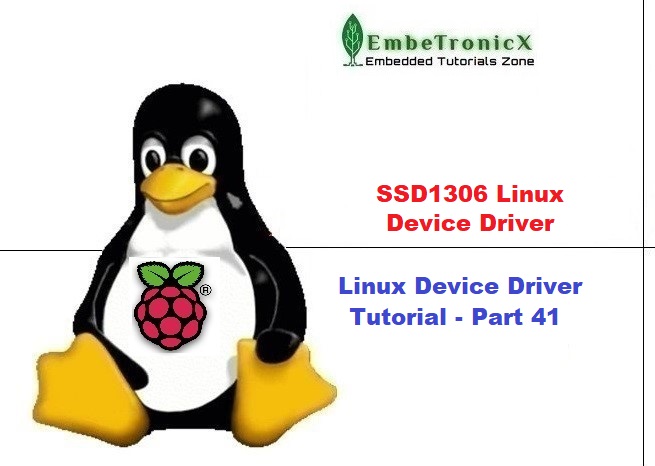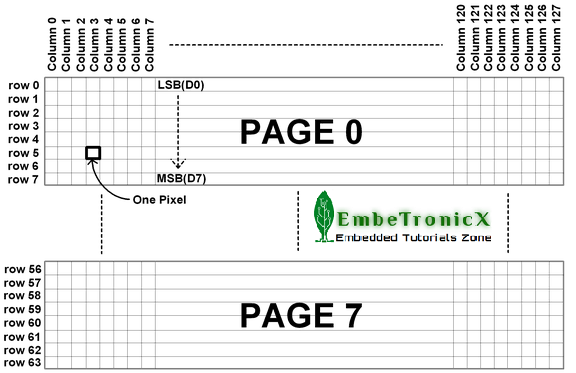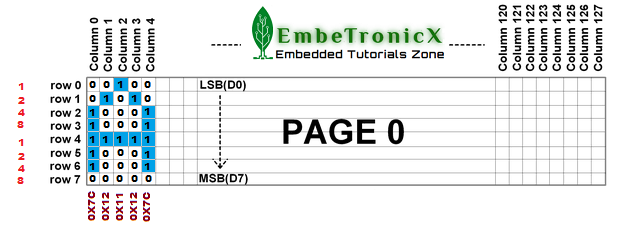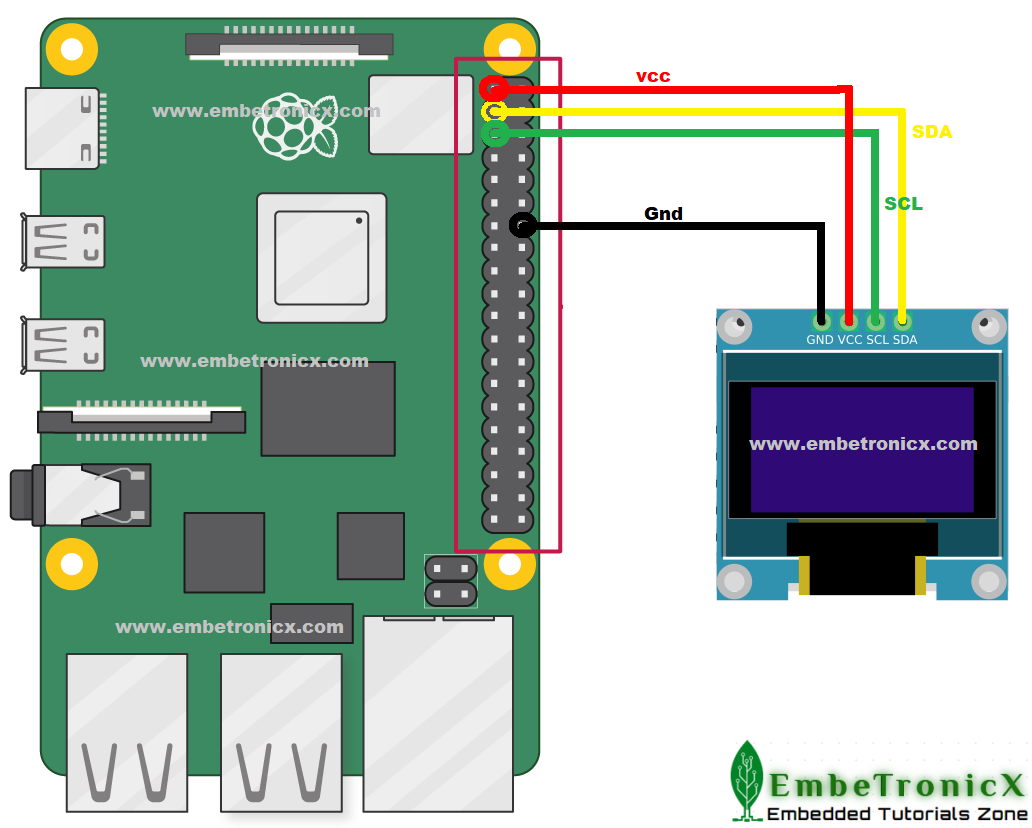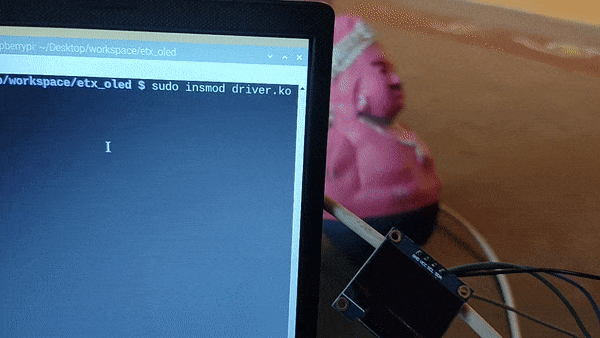This article is a continuation of the Series on Linux Device Drivers and carries the discussion on Linux device drivers and their implementation. The aim of this series is to provide easy and practical examples that anyone can understand. This is the SSD1306 I2C Linux Device Driver using Raspberry PI – Linux Device Driver Tutorial Part 41.
You can also read I2C basics, I2C client driver, I2C bus driver, Procfs, Workqueue, Completion, Softirq, and threaded IRQ in the Linux device driver.
We are using the Raspberry PI 4 Model B for this demonstration.
Table of Contents
SSD1306 I2C Linux Device Driver
SSD1306 OLED
In our previous tutorial, we have seen some basic operations like command and data. So you guys know how to send commands and data. Before that, you need to know how the display is structured inside.
Basically SSD1306 has 8 lines (pages) and 128 columns(segments). Please refer to the below image for a clear understanding.
|
|
|
Each page contains 8 rows. So, a total of 64 rows will be present in the SSD1306’s GDDRAM (Graphics Display Data RAM). The GDDRAM (Graphics Display Data RAM) is a bitmapped static RAM. It holds the bit pattern to be displayed. For understanding the rows, please look at the image below.
As per our understanding, it has 128 columns and 64 rows. So the size of GDDRAM is 128 x 64 bits and it is divided into eight pages, from PAGE0 to PAGE7, which are used for monochrome 128×64 dot matrix display as shown in the above figure.
In this tutorial, we are going to write one character in 5×8. The below image explains how to write our characters. In that, I have taken Page 0’s row 0 to row 7 and column 0 to column 4 to explain how to write our characters.
|
|
|
I think the above image is self-explanatory. I am trying to write the character ‘A’ (5×8) from row 0 and column 0. In order to write ‘A’, I need to make the cursor on page 0 and column 0. Then write 0x7C, 0x12, 0x11, 0x12 and 0x7C. Look at the array SSD1306_font in the source code to get the data for almost all characters.
Since you can write data pixel by pixel, you can print anything you want.
Commands in SSD1306
There are many commands available. Some commands are given below.
| Command | Command | Description | ||
|---|---|---|---|---|
| 0x00 | COMMAND | This command is used to indicate the next data byte is acted as a command. | ||
| 0x40~0x7F | Display Start Line | This command sets the Display Start Line register to determine the starting address of display RAM | ||
| 0xAE | Display OFF | This command is used to turn OFF the OLED display panel. | ||
| 0xAF | Display ON | This command is used to turn ON the OLED display panel. | ||
| 0x20 | Memory Addressing Mode | If horizontal address increment mode is enabled by command 20h, after finishing read/write one column data, it is incremented automatically to the next column address. | ||
| 0x26/0x27 | Continuous Horizontal Scroll | 0x26 – Right horizontal scroll
0x27 – Left horizontal scroll |
||
| 0x29/0x2A | Continuous Vertical and Horizontal Scroll | 0x29 – Vertical and Right Horizontal Scroll
0x2A – Vertical and Left Horizontal Scroll |
||
| 0x2E | Deactivate Scroll | This command deactivates the scroll. | ||
| 0x2F | Activate Scroll | This command activates the scroll if it is configured before. | ||
| 0x21 | Column Address | This command is used to define the current read/write column address in graphic display data RAM. | ||
| 0x22 | Page Address | This command is used to define the current read/write Line(Page as per data sheet) address in graphic display data RAM. | ||
| 0x81 | Contrast Control | This command sets the Contrast Setting of the display. The chip has 256 contrast steps from 00h to FFh. The segment output current increases as the contrast step value increases. | ||
| 0xA0 | Segment Re-map | This command sets the column address 0 is mapped to SEG0. | ||
| 0xA1 | Segment Re-map | This command sets the column address 127 is mapped to SEG0. | ||
| 0xA6 | Normal Display | This command sets the display to normal mode. In the normal display, a RAM data of 1 indicates an “ON” pixel. | ||
| 0xA7 | Inverse Display | This command sets the display to inverse mode. In the normal display, a RAM data of 0 indicates an “ON” pixel. | ||
| 0xA8 | Multiplex Ratio | This command sets the display multiplex ratio. | ||
| 0xC0/0xC8 | COM Output Scan direction | 0xC0 – Normal mode (RESET) Scan from COM0 to COM[N –1]
0xC8- Remapped mode. Scan from COM[N-1] to COM0 Where N is the Multiplex ratio. |
||
| 0xD3 | Display Offset | This command sets vertical shift by COM from 0d~63d. | ||
| 0xD5 | Display Clock Divide Ratio/Oscillator Frequency |
This command sets the display Clock Divide Ratio and Oscillator Frequency. |
Please go through the datasheet for complete commands. Commands are pretty straight forward. You will understand those commands easily.
Data
So now, our focus is data, not the commands. We can print anything we want, using this SSD1306 OLED, unlike other alphanumerical displays. Graphical data also we can print. But in this tutorial, we will see how to write strings into it. If you get the idea, then you can create your own custom character or logo and print that in that OLED display.
|
|
|
For more information, please refer to the datasheet of the SSED1306.
Note: If you don’t know how to send commands and data, please look at this tutorial.
Example Programming
In our previous tutorial, we have explained the I2C driver in Linux. But in that tutorial, we haven’t explored the SSD1306 OLED much, except turning ON and OFF that display. So we wanted to write one tutorial to print some strings.
The concept of this example is, we will print “Welcome To EmbeTronicX” and scroll that after loading the driver. After that, we will print “Thank You!!!” during the unloading process.
Please enable the I2C in the Raspberry Pi if you haven’t enabled it before.
|
|
|
Connection diagram
- GPIO 2 – SDA
- GPIO 3 – SCL
SSD1306 I2C Linux Device Driver – Driver Source Code
[Get the source code from GitHub]
/***************************************************************************//**
* \file driver.c
*
* \details SSD_1306 OLED Display I2C driver
*
* \author EmbeTronicX
*
* \Tested with Linux raspberrypi 5.4.51-v7l+
*
* *******************************************************************************/
#include <linux/module.h>
#include <linux/init.h>
#include <linux/slab.h>
#include <linux/i2c.h>
#include <linux/delay.h>
#include <linux/kernel.h>
#define I2C_BUS_AVAILABLE ( 1 ) // I2C Bus available in our Raspberry Pi
#define SLAVE_DEVICE_NAME ( "ETX_OLED" ) // Device and Driver Name
#define SSD1306_SLAVE_ADDR ( 0x3C ) // SSD1306 OLED Slave Address
#define SSD1306_MAX_SEG ( 128 ) // Maximum segment
#define SSD1306_MAX_LINE ( 7 ) // Maximum line
#define SSD1306_DEF_FONT_SIZE ( 5 ) // Default font size
/*
** Function prototypes.
*/
static int I2C_Read( unsigned char *out_buf, unsigned int len );
static int I2C_Write( unsigned char *buf, unsigned int len );
static void SSD1306_PrintChar( unsigned char c );
static void SSD1306_String( unsigned char *str );
static void SSD1306_InvertDisplay(bool need_to_invert);
static void SSD1306_SetBrightness(uint8_t brightnessValue);
static void SSD1306_StartScrollHorizontal( bool is_left_scroll,
uint8_t start_line_no,
uint8_t end_line_no
);
static void SSD1306_StartScrollVerticalHorizontal( bool is_vertical_left_scroll,
uint8_t start_line_no,
uint8_t end_line_no,
uint8_t vertical_area,
uint8_t rows
);
static int SSD1306_DisplayInit( void );
static void SSD1306_Fill( unsigned char data );
static void SSD1306_GoToNextLine( void );
static void SSD1306_SetCursor( uint8_t lineNo, uint8_t cursorPos );
static void SSD1306_Write(bool is_cmd, unsigned char data);
static struct i2c_adapter *etx_i2c_adapter = NULL; // I2C Adapter Structure
static struct i2c_client *etx_i2c_client_oled = NULL; // I2C Cient Structure (In our case it is OLED)
/*
** Variable to store Line Number and Cursor Position.
*/
static uint8_t SSD1306_LineNum = 0;
static uint8_t SSD1306_CursorPos = 0;
static uint8_t SSD1306_FontSize = SSD1306_DEF_FONT_SIZE;
/*
** Array Variable to store the letters.
*/
static const unsigned char SSD1306_font[][SSD1306_DEF_FONT_SIZE]=
{
{0x00, 0x00, 0x00, 0x00, 0x00}, // space
{0x00, 0x00, 0x2f, 0x00, 0x00}, // !
{0x00, 0x07, 0x00, 0x07, 0x00}, // "
{0x14, 0x7f, 0x14, 0x7f, 0x14}, // #
{0x24, 0x2a, 0x7f, 0x2a, 0x12}, // $
{0x23, 0x13, 0x08, 0x64, 0x62}, // %
{0x36, 0x49, 0x55, 0x22, 0x50}, // &
{0x00, 0x05, 0x03, 0x00, 0x00}, // '
{0x00, 0x1c, 0x22, 0x41, 0x00}, // (
{0x00, 0x41, 0x22, 0x1c, 0x00}, // )
{0x14, 0x08, 0x3E, 0x08, 0x14}, // *
{0x08, 0x08, 0x3E, 0x08, 0x08}, // +
{0x00, 0x00, 0xA0, 0x60, 0x00}, // ,
{0x08, 0x08, 0x08, 0x08, 0x08}, // -
{0x00, 0x60, 0x60, 0x00, 0x00}, // .
{0x20, 0x10, 0x08, 0x04, 0x02}, // /
{0x3E, 0x51, 0x49, 0x45, 0x3E}, // 0
{0x00, 0x42, 0x7F, 0x40, 0x00}, // 1
{0x42, 0x61, 0x51, 0x49, 0x46}, // 2
{0x21, 0x41, 0x45, 0x4B, 0x31}, // 3
{0x18, 0x14, 0x12, 0x7F, 0x10}, // 4
{0x27, 0x45, 0x45, 0x45, 0x39}, // 5
{0x3C, 0x4A, 0x49, 0x49, 0x30}, // 6
{0x01, 0x71, 0x09, 0x05, 0x03}, // 7
{0x36, 0x49, 0x49, 0x49, 0x36}, // 8
{0x06, 0x49, 0x49, 0x29, 0x1E}, // 9
{0x00, 0x36, 0x36, 0x00, 0x00}, // :
{0x00, 0x56, 0x36, 0x00, 0x00}, // ;
{0x08, 0x14, 0x22, 0x41, 0x00}, // <
{0x14, 0x14, 0x14, 0x14, 0x14}, // =
{0x00, 0x41, 0x22, 0x14, 0x08}, // >
{0x02, 0x01, 0x51, 0x09, 0x06}, // ?
{0x32, 0x49, 0x59, 0x51, 0x3E}, // @
{0x7C, 0x12, 0x11, 0x12, 0x7C}, // A
{0x7F, 0x49, 0x49, 0x49, 0x36}, // B
{0x3E, 0x41, 0x41, 0x41, 0x22}, // C
{0x7F, 0x41, 0x41, 0x22, 0x1C}, // D
{0x7F, 0x49, 0x49, 0x49, 0x41}, // E
{0x7F, 0x09, 0x09, 0x09, 0x01}, // F
{0x3E, 0x41, 0x49, 0x49, 0x7A}, // G
{0x7F, 0x08, 0x08, 0x08, 0x7F}, // H
{0x00, 0x41, 0x7F, 0x41, 0x00}, // I
{0x20, 0x40, 0x41, 0x3F, 0x01}, // J
{0x7F, 0x08, 0x14, 0x22, 0x41}, // K
{0x7F, 0x40, 0x40, 0x40, 0x40}, // L
{0x7F, 0x02, 0x0C, 0x02, 0x7F}, // M
{0x7F, 0x04, 0x08, 0x10, 0x7F}, // N
{0x3E, 0x41, 0x41, 0x41, 0x3E}, // O
{0x7F, 0x09, 0x09, 0x09, 0x06}, // P
{0x3E, 0x41, 0x51, 0x21, 0x5E}, // Q
{0x7F, 0x09, 0x19, 0x29, 0x46}, // R
{0x46, 0x49, 0x49, 0x49, 0x31}, // S
{0x01, 0x01, 0x7F, 0x01, 0x01}, // T
{0x3F, 0x40, 0x40, 0x40, 0x3F}, // U
{0x1F, 0x20, 0x40, 0x20, 0x1F}, // V
{0x3F, 0x40, 0x38, 0x40, 0x3F}, // W
{0x63, 0x14, 0x08, 0x14, 0x63}, // X
{0x07, 0x08, 0x70, 0x08, 0x07}, // Y
{0x61, 0x51, 0x49, 0x45, 0x43}, // Z
{0x00, 0x7F, 0x41, 0x41, 0x00}, // [
{0x55, 0xAA, 0x55, 0xAA, 0x55}, // Backslash (Checker pattern)
{0x00, 0x41, 0x41, 0x7F, 0x00}, // ]
{0x04, 0x02, 0x01, 0x02, 0x04}, // ^
{0x40, 0x40, 0x40, 0x40, 0x40}, // _
{0x00, 0x03, 0x05, 0x00, 0x00}, // `
{0x20, 0x54, 0x54, 0x54, 0x78}, // a
{0x7F, 0x48, 0x44, 0x44, 0x38}, // b
{0x38, 0x44, 0x44, 0x44, 0x20}, // c
{0x38, 0x44, 0x44, 0x48, 0x7F}, // d
{0x38, 0x54, 0x54, 0x54, 0x18}, // e
{0x08, 0x7E, 0x09, 0x01, 0x02}, // f
{0x18, 0xA4, 0xA4, 0xA4, 0x7C}, // g
{0x7F, 0x08, 0x04, 0x04, 0x78}, // h
{0x00, 0x44, 0x7D, 0x40, 0x00}, // i
{0x40, 0x80, 0x84, 0x7D, 0x00}, // j
{0x7F, 0x10, 0x28, 0x44, 0x00}, // k
{0x00, 0x41, 0x7F, 0x40, 0x00}, // l
{0x7C, 0x04, 0x18, 0x04, 0x78}, // m
{0x7C, 0x08, 0x04, 0x04, 0x78}, // n
{0x38, 0x44, 0x44, 0x44, 0x38}, // o
{0xFC, 0x24, 0x24, 0x24, 0x18}, // p
{0x18, 0x24, 0x24, 0x18, 0xFC}, // q
{0x7C, 0x08, 0x04, 0x04, 0x08}, // r
{0x48, 0x54, 0x54, 0x54, 0x20}, // s
{0x04, 0x3F, 0x44, 0x40, 0x20}, // t
{0x3C, 0x40, 0x40, 0x20, 0x7C}, // u
{0x1C, 0x20, 0x40, 0x20, 0x1C}, // v
{0x3C, 0x40, 0x30, 0x40, 0x3C}, // w
{0x44, 0x28, 0x10, 0x28, 0x44}, // x
{0x1C, 0xA0, 0xA0, 0xA0, 0x7C}, // y
{0x44, 0x64, 0x54, 0x4C, 0x44}, // z
{0x00, 0x10, 0x7C, 0x82, 0x00}, // {
{0x00, 0x00, 0xFF, 0x00, 0x00}, // |
{0x00, 0x82, 0x7C, 0x10, 0x00}, // }
{0x00, 0x06, 0x09, 0x09, 0x06} // ~ (Degrees)
};
/*
** This function writes the data into the I2C client
**
** Arguments:
** buff -> buffer to be sent
** len -> Length of the data
**
*/
static int I2C_Write(unsigned char *buf, unsigned int len)
{
/*
** Sending Start condition, Slave address with R/W bit,
** ACK/NACK and Stop condtions will be handled internally.
*/
int ret = i2c_master_send(etx_i2c_client_oled, buf, len);
return ret;
}
/*
** This function reads one byte of the data from the I2C client
**
** Arguments:
** out_buff -> buffer wherer the data to be copied
** len -> Length of the data to be read
**
*/
static int I2C_Read(unsigned char *out_buf, unsigned int len)
{
/*
** Sending Start condition, Slave address with R/W bit,
** ACK/NACK and Stop condtions will be handled internally.
*/
int ret = i2c_master_recv(etx_i2c_client_oled, out_buf, len);
return ret;
}
/*
** This function is specific to the SSD_1306 OLED.
** This function sends the command/data to the OLED.
**
** Arguments:
** is_cmd -> true = command, flase = data
** data -> data to be written
**
*/
static void SSD1306_Write(bool is_cmd, unsigned char data)
{
unsigned char buf[2] = {0};
int ret;
/*
** First byte is always control byte. Data is followed after that.
**
** There are two types of data in SSD_1306 OLED.
** 1. Command
** 2. Data
**
** Control byte decides that the next byte is, command or data.
**
** -------------------------------------------------------
** | Control byte's | 6th bit | 7th bit |
** |-----------------------------|----------|------------|
** | Command | 0 | 0 |
** |-----------------------------|----------|------------|
** | data | 1 | 0 |
** |-----------------------------|----------|------------|
**
** Please refer the datasheet for more information.
**
*/
if( is_cmd == true )
{
buf[0] = 0x00;
}
else
{
buf[0] = 0x40;
}
buf[1] = data;
ret = I2C_Write(buf, 2);
}
/*
** This function is specific to the SSD_1306 OLED.
**
** Arguments:
** lineNo -> Line Number
** cursorPos -> Cursor Position
**
*/
static void SSD1306_SetCursor( uint8_t lineNo, uint8_t cursorPos )
{
/* Move the Cursor to specified position only if it is in range */
if((lineNo <= SSD1306_MAX_LINE) && (cursorPos < SSD1306_MAX_SEG))
{
SSD1306_LineNum = lineNo; // Save the specified line number
SSD1306_CursorPos = cursorPos; // Save the specified cursor position
SSD1306_Write(true, 0x21); // cmd for the column start and end address
SSD1306_Write(true, cursorPos); // column start addr
SSD1306_Write(true, SSD1306_MAX_SEG-1); // column end addr
SSD1306_Write(true, 0x22); // cmd for the page start and end address
SSD1306_Write(true, lineNo); // page start addr
SSD1306_Write(true, SSD1306_MAX_LINE); // page end addr
}
}
/*
** This function is specific to the SSD_1306 OLED.
** This function move the cursor to the next line.
**
** Arguments:
** none
**
*/
static void SSD1306_GoToNextLine( void )
{
/*
** Increment the current line number.
** roll it back to first line, if it exceeds the limit.
*/
SSD1306_LineNum++;
SSD1306_LineNum = (SSD1306_LineNum & SSD1306_MAX_LINE);
SSD1306_SetCursor(SSD1306_LineNum,0); /* Finally move it to next line */
}
/*
** This function is specific to the SSD_1306 OLED.
** This function sends the single char to the OLED.
**
** Arguments:
** c -> character to be written
**
*/
static void SSD1306_PrintChar(unsigned char c)
{
uint8_t data_byte;
uint8_t temp = 0;
/*
** If we character is greater than segment len or we got new line charcter
** then move the cursor to the new line
*/
if( (( SSD1306_CursorPos + SSD1306_FontSize ) >= SSD1306_MAX_SEG ) ||
( c == '\n' )
)
{
SSD1306_GoToNextLine();
}
// print charcters other than new line
if( c != '\n' )
{
/*
** In our font array (SSD1306_font), space starts in 0th index.
** But in ASCII table, Space starts from 32 (0x20).
** So we need to match the ASCII table with our font table.
** We can subtract 32 (0x20) in order to match with our font table.
*/
c -= 0x20; //or c -= ' ';
do
{
data_byte= SSD1306_font[c][temp]; // Get the data to be displayed from LookUptable
SSD1306_Write(false, data_byte); // write data to the OLED
SSD1306_CursorPos++;
temp++;
} while ( temp < SSD1306_FontSize);
SSD1306_Write(false, 0x00); //Display the data
SSD1306_CursorPos++;
}
}
/*
** This function is specific to the SSD_1306 OLED.
** This function sends the string to the OLED.
**
** Arguments:
** str -> string to be written
**
*/
static void SSD1306_String(unsigned char *str)
{
while(*str)
{
SSD1306_PrintChar(*str++);
}
}
/*
** This function is specific to the SSD_1306 OLED.
** This function inverts the display.
**
** Arguments:
** need_to_invert -> true - invert display
** false - normal display
**
*/
static void SSD1306_InvertDisplay(bool need_to_invert)
{
if(need_to_invert)
{
SSD1306_Write(true, 0xA7); // Invert the display
}
else
{
SSD1306_Write(true, 0xA6); // Normal display
}
}
/*
** This function is specific to the SSD_1306 OLED.
** This function sets the brightness of the display.
**
** Arguments:
** brightnessValue -> true - invert display
**
*/
static void SSD1306_SetBrightness(uint8_t brightnessValue)
{
SSD1306_Write(true, 0x81); // Contrast command
SSD1306_Write(true, brightnessValue); // Contrast value (default value = 0x7F)
}
/*
** This function is specific to the SSD_1306 OLED.
** This function Scrolls the data right/left in horizontally.
**
** Arguments:
** is_left_scroll -> true - left horizontal scroll
false - right horizontal scroll
start_line_no -> Start address of the line to scroll
end_line_no -> End address of the line to scroll
**
*/
static void SSD1306_StartScrollHorizontal( bool is_left_scroll,
uint8_t start_line_no,
uint8_t end_line_no
)
{
if(is_left_scroll)
{
// left horizontal scroll
SSD1306_Write(true, 0x27);
}
else
{
// right horizontal scroll
SSD1306_Write(true, 0x26);
}
SSD1306_Write(true, 0x00); // Dummy byte (dont change)
SSD1306_Write(true, start_line_no); // Start page address
SSD1306_Write(true, 0x00); // 5 frames interval
SSD1306_Write(true, end_line_no); // End page address
SSD1306_Write(true, 0x00); // Dummy byte (dont change)
SSD1306_Write(true, 0xFF); // Dummy byte (dont change)
SSD1306_Write(true, 0x2F); // activate scroll
}
/*
** This function is specific to the SSD_1306 OLED.
** This function Scrolls the data in vertically and right/left horizontally(Diagonally).
**
** Arguments:
** is_vertical_left_scroll -> true - vertical and left horizontal scroll
** false - vertical and right horizontal scroll
** start_line_no -> Start address of the line to scroll
** end_line_no -> End address of the line to scroll
** vertical_area -> Area for vertical scroll (0-63)
** rows -> Number of rows to scroll vertically
**
*/
static void SSD1306_StartScrollVerticalHorizontal( bool is_vertical_left_scroll,
uint8_t start_line_no,
uint8_t end_line_no,
uint8_t vertical_area,
uint8_t rows
)
{
SSD1306_Write(true, 0xA3); // Set Vertical Scroll Area
SSD1306_Write(true, 0x00); // Check datasheet
SSD1306_Write(true, vertical_area); // area for vertical scroll
if(is_vertical_left_scroll)
{
// vertical and left horizontal scroll
SSD1306_Write(true, 0x2A);
}
else
{
// vertical and right horizontal scroll
SSD1306_Write(true, 0x29);
}
SSD1306_Write(true, 0x00); // Dummy byte (dont change)
SSD1306_Write(true, start_line_no); // Start page address
SSD1306_Write(true, 0x00); // 5 frames interval
SSD1306_Write(true, end_line_no); // End page address
SSD1306_Write(true, rows); // Vertical scrolling offset
SSD1306_Write(true, 0x2F); // activate scroll
}
/*
** This function sends the commands that need to used to Initialize the OLED.
**
** Arguments:
** none
**
*/
static int SSD1306_DisplayInit(void)
{
msleep(100); // delay
/*
** Commands to initialize the SSD_1306 OLED Display
*/
SSD1306_Write(true, 0xAE); // Entire Display OFF
SSD1306_Write(true, 0xD5); // Set Display Clock Divide Ratio and Oscillator Frequency
SSD1306_Write(true, 0x80); // Default Setting for Display Clock Divide Ratio and Oscillator Frequency that is recommended
SSD1306_Write(true, 0xA8); // Set Multiplex Ratio
SSD1306_Write(true, 0x3F); // 64 COM lines
SSD1306_Write(true, 0xD3); // Set display offset
SSD1306_Write(true, 0x00); // 0 offset
SSD1306_Write(true, 0x40); // Set first line as the start line of the display
SSD1306_Write(true, 0x8D); // Charge pump
SSD1306_Write(true, 0x14); // Enable charge dump during display on
SSD1306_Write(true, 0x20); // Set memory addressing mode
SSD1306_Write(true, 0x00); // Horizontal addressing mode
SSD1306_Write(true, 0xA1); // Set segment remap with column address 127 mapped to segment 0
SSD1306_Write(true, 0xC8); // Set com output scan direction, scan from com63 to com 0
SSD1306_Write(true, 0xDA); // Set com pins hardware configuration
SSD1306_Write(true, 0x12); // Alternative com pin configuration, disable com left/right remap
SSD1306_Write(true, 0x81); // Set contrast control
SSD1306_Write(true, 0x80); // Set Contrast to 128
SSD1306_Write(true, 0xD9); // Set pre-charge period
SSD1306_Write(true, 0xF1); // Phase 1 period of 15 DCLK, Phase 2 period of 1 DCLK
SSD1306_Write(true, 0xDB); // Set Vcomh deselect level
SSD1306_Write(true, 0x20); // Vcomh deselect level ~ 0.77 Vcc
SSD1306_Write(true, 0xA4); // Entire display ON, resume to RAM content display
SSD1306_Write(true, 0xA6); // Set Display in Normal Mode, 1 = ON, 0 = OFF
SSD1306_Write(true, 0x2E); // Deactivate scroll
SSD1306_Write(true, 0xAF); // Display ON in normal mode
//Clear the display
SSD1306_Fill(0x00);
return 0;
}
/*
** This function Fills the complete OLED with this data byte.
**
** Arguments:
** data -> Data to be filled in the OLED
**
*/
static void SSD1306_Fill(unsigned char data)
{
unsigned int total = 128 * 8; // 8 pages x 128 segments x 8 bits of data
unsigned int i = 0;
//Fill the Display
for(i = 0; i < total; i++)
{
SSD1306_Write(false, data);
}
}
/*
** This function getting called when the slave has been found
** Note : This will be called only once when we load the driver.
*/
static int etx_oled_probe(struct i2c_client *client,
const struct i2c_device_id *id)
{
SSD1306_DisplayInit();
//Set cursor
SSD1306_SetCursor(0,0);
SSD1306_StartScrollHorizontal( true, 0, 2);
//Write String to OLED
SSD1306_String("Welcome\nTo\nEmbeTronicX\n\n");
pr_info("OLED Probed!!!\n");
return 0;
}
/*
** This function getting called when the slave has been removed
** Note : This will be called only once when we unload the driver.
*/
static int etx_oled_remove(struct i2c_client *client)
{
//Set cursor
//SSD1306_SetCursor(2,0);
//Write String to OLED
SSD1306_String("ThanK YoU!!!");
msleep(1000);
//Set cursor
SSD1306_SetCursor(0,0);
//clear the display
SSD1306_Fill(0x00);
SSD1306_Write(true, 0xAE); // Entire Display OFF
pr_info("OLED Removed!!!\n");
return 0;
}
/*
** Structure that has slave device id
*/
static const struct i2c_device_id etx_oled_id[] = {
{ SLAVE_DEVICE_NAME, 0 },
{ }
};
MODULE_DEVICE_TABLE(i2c, etx_oled_id);
/*
** I2C driver Structure that has to be added to linux
*/
static struct i2c_driver etx_oled_driver = {
.driver = {
.name = SLAVE_DEVICE_NAME,
.owner = THIS_MODULE,
},
.probe = etx_oled_probe,
.remove = etx_oled_remove,
.id_table = etx_oled_id,
};
/*
** I2C Board Info strucutre
*/
static struct i2c_board_info oled_i2c_board_info = {
I2C_BOARD_INFO(SLAVE_DEVICE_NAME, SSD1306_SLAVE_ADDR)
};
/*
** Module Init function
*/
static int __init etx_driver_init(void)
{
int ret = -1;
etx_i2c_adapter = i2c_get_adapter(I2C_BUS_AVAILABLE);
if( etx_i2c_adapter != NULL )
{
etx_i2c_client_oled = i2c_new_device(etx_i2c_adapter, &oled_i2c_board_info);
if( etx_i2c_client_oled != NULL )
{
i2c_add_driver(&etx_oled_driver);
ret = 0;
}
i2c_put_adapter(etx_i2c_adapter);
}
pr_info("Driver Added!!!\n");
return ret;
}
/*
** Module Exit function
*/
static void __exit etx_driver_exit(void)
{
i2c_unregister_device(etx_i2c_client_oled);
i2c_del_driver(&etx_oled_driver);
pr_info("Driver Removed!!!\n");
}
module_init(etx_driver_init);
module_exit(etx_driver_exit);
MODULE_LICENSE("GPL");
MODULE_AUTHOR("EmbeTronicX <[email protected]>");
MODULE_DESCRIPTION("SSD1306 I2C Driver");
MODULE_VERSION("1.40");
Makefile
obj-m += driver.o
KDIR = /lib/modules/$(shell uname -r)/build
all:
make -C $(KDIR) M=$(shell pwd) modules
clean:
make -C $(KDIR) M=$(shell pwd) clean
Testing the Device Driver
- Build the driver by using Makefile (
sudo make) - Load the driver using
sudo insmod driver.ko - The display should show “Welcome To EmbeTronicX” and it should scroll.
- Unload the driver using
sudo rmmod driver - “Thank you” print has to come and the display should be cleared after 1 second.
Demo
Click here if you don’t see the output gif
In our next tutorial, we will discuss the Poll in the Linux device driver.
|
|
|
Please find the other Linux device driver tutorials here.
You can also read the below tutorials.

Embedded Software | Firmware | Linux Devic Deriver | RTOS
Hi, I am a tech blogger and an Embedded Engineer. I am always eager to learn and explore tech-related concepts. And also, I wanted to share my knowledge with everyone in a more straightforward way with easy practical examples. I strongly believe that learning by doing is more powerful than just learning by reading. I love to do experiments. If you want to help or support me on my journey, consider sharing my articles, or Buy me a Coffee! Thank you for reading my blog! Happy learning!

